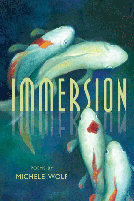nycBigCityLit.com the rivers of it, abridged


Reviews
Fall 2011
Immersion
by Michele Wolf

Immersion
by Michele Wolf
The Word Works, 2011; 90 pages; $15.00
ISBN: 9780915380800, paper
http://michelewolf.com/books.html
Reviewed by Tina Barr
Michele Wolf's Immersion is a deftly organized collection of narrative poems. Wolf orchestrates a poignant, even comic, series, safely this side of the sentimental. From the perspective of middle age, we are immersed in "the bristling panorama that is adulthood," reflected in a range of poems based on the adoption of a Chinese girl, made available to this American couple because of China's limits on family size, or the physical terrors of returning veterans from Iraq, or an eight year old Zambian girl's future, or poems on the varieties of marital love, or death through "the slow acid of cancer." The circumstances in these poems are conveyed in direct, transparent, often incandescent language. The poet and her husband's adoption of their daughter is central to the speaker's life in relation to others; the book incorporates poems on husband, mother, father, sister, niece, cousin and aunt. But the poems push outward, into Civil War history, a celebration of Chinese New Year, the imagined life of a Barbie doll, on the subject of writing as a journalist and as a poet. One of the poems on writing is the marvelous "Arranging the Books." In this poem the writer recollects W. S. Merwin, "his eyes, a crystal blue like captured starlight." The final lines recall his advice, "'We don't write poems,'" he maintained, "'We listen for them.'"
The book opens with "The Great Tsunami," "capped with ringlets of foam," in which a couple regards a print in a museum. The print depicts two lovers and his recognition that she will be caught by the wave, but simultaneously implicit is the comparison to the present, in which "She recognizes its crest in the way he looks at her." We apprehend the overwhelming affection of the husband, as he and the speaker pause in front of this print, as well as the affection between the doomed small figures in the print itself.
The wave is flooding his heart.
And he is sending the flood
Her way. It rushes
Over her.
The poem ends on the remarkable juxtaposition of two questions:
Can you look at one face
For the whole of a life?
Does the moon peer down
At the tides and hunger for home?
The poet's attention to language is reflected in the study of Chinese, so that her daughter will learn her first language, "the froth of words, that formed / The slosh and current of your life before / You could speak." The ending is typical of the warmth and compassion in this radiant book, during which an "Asian American clerk" in the post office, "with accented English, clenching my heart in her hands, / inquired, 'She's yours?' I managed to answer, 'Yes. And I'm hers.' / Why couldn't she see I had become Chinese?"
There are a number of such transcendent moments, the speaker and her husband on vacation, while "a shimmering long-tailed hummingbird— / hovered like a miniature copter in front of a blood-red / Hibiscus." Wolf frames these narratives with a sense of portent, immersing us in the realization "in our middle / Years, how little life has prepared us for." Her palpable engagement and devotion to writing about our human range of experience is reflected in poems that take place across space and time, in the "polytrauma hospital, for soldiers who return / Ripped apart," or "consumed" by a lion's "golden eyes" in Zambia, before discovering a spider "The size of my hand in the toilet's pool." One of the poems incorporates the book's motif of water in a charmingly comic vignette. Entitled "Eating Minnows," it opens with the lines "He had assumed he was eating french fries / Until he realized each of the short, golden / Sticks bore eyes." Transformation, birth, and death are explored alongside small effervescent moments of recognition. In the poem "Skin," the poet addresses her daughter in the second person. "'Mommy,' / you squealed, cupping my cheeks, / With your hands, 'I have a yellow face!'" /… "But before I could say, 'Honey, / You are golden,' and 'All skin colors are / Beautiful,' you announced, 'I'm a bumblebee!'"
In "Baby in a Basket," Wolf's description of her daughter's photograph at four months is representative of her compelling, perceptive vision, conveyed in poems that teach us again and again, how to be present, how to hold to the redemptive.
We were ready, with these first photos, for you to be
Cute, but not to be beautiful—which smacked through us
Like a convulsion. We study your startled onyx eyes, alert
As birds at play in a pond, tawny embossed blossom
Of lips, fringe of hair a fluffy nimbus floating above you.
Tina Barr's awards include fellowships from the National Endowment for the Arts, the Tennessee Arts Commission, the Pennsylvania Council on the Arts, The MacDowell Colony, and the Ucross Foundation. Her reviews, poems and essays have appeared in journals such as The Harvard Review, Louisiana Literature, The Mississippi Review, Shenandoah, Witness, Crab Orchard Review, Notre Dame Review and elsewhere.